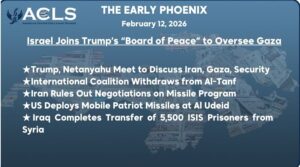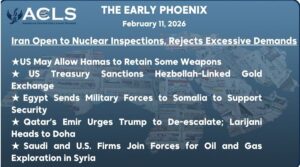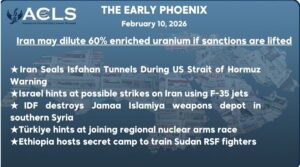Foreign Policy Perspectives- Guiding Tomorrow
Transcribed by: Rania Kisar
October 16, 2024
In a discussion on TV7 Israel News, Professor Russell Burman, former senior advisor at the U.S. State Department’s foreign planning staff and current director of the Middle East and Islamic World project at Stanford University’s Hoover Institution, and Marshall Billingsley, former assistant secretary general of NATO and former assistant secretary of the U.S. Treasury for countering terrorist financing, shared their insights on U.S. foreign policy and its implications for the Middle East and global security.
The discussion was moderated by Jonathan Hessen, who is not only the anchor of TV7 Israel News but also a Senior Fellow at the Hudson Institute. As a respected voice in security analysis, Hessen guided the conversation to explore the critical implications of U.S. foreign policy for Israel and the wider Middle East, particularly in light of the upcoming U.S. elections and ongoing regional conflicts. His expertise brought further depth to the dialogue, particularly on the convergence of interests between the U.S. and its Middle Eastern allies.
Burman highlighted that if former President Donald Trump returns to office, his administration would likely revert to a firm stance against Iran. This would involve reimposing and enforcing sanctions that the Biden administration has allowed to weaken, thereby increasing pressure on Iran to withdraw from its destabilizing activities across the region. Burman noted that Iran has supported Hezbollah, Hamas, and the Houthis, all of which have been weakened but remain threats. He criticized the Biden administration’s ambivalence towards these groups, comparing it to the hesitancy seen in U.S. support for Ukraine, where the administration has refrained from providing sufficient military aid to enable victory. Burman argued that a potential Harris administration would likely continue this pattern, asserting principles such as Israel’s right to self-defense but with considerable limitations.
Burman further underscored the importance of addressing the broader geopolitical dynamics, particularly the loose partnership between Iran, Russia, and China. While each country has its own interests, they are cooperating in ways that undermine U.S. and Western interests. He suggested that U.S. foreign policy should focus on breaking this triangle by exploiting the differences in their objectives. Specifically, Burman pointed to the need for targeting Iran’s drone factories, which are supplying Russia in its war against Ukraine, as a direct link between Middle Eastern and Eastern European theaters. He also emphasized that the Western Pacific, particularly China’s ambitions regarding Taiwan, would become increasingly important. While the U.S. must not pivot entirely away from other theaters, addressing the threat from China is critical, as losing Taiwan would have devastating consequences for the entire region, including Japan and the Philippines.
Marshall Billingsley echoed many of Burman’s points, starting by noting that the world was largely at peace when Trump left office in 2021 but is now on fire under the Biden administration. Should Trump return to power, Billingsley believes he would focus on several key actions, the first of which would be to fully reimpose sanctions on Iran. Billingsley highlighted that under Biden, Iran’s oil exports have surged sixfold, with last year’s exports totaling over $50 billion, primarily to China. The total windfall for Iran under Biden has reached $130 billion, most of which has funded the regime’s nuclear and weapons programs, as well as its terrorist proxies, rather than benefiting the Iranian people. Billingsley stressed that cutting off these funds would be a priority under Trump.
Billingsley also emphasized the need to remove restrictions on U.S. Central Command in dealing with the Houthis. He argued that the Houthis’ repeated attacks on global shipping in the Red Sea must be stopped, likely through a forceful U.S. response that targets their leadership and ability to conduct terror operations.
While acknowledging that China is the principal long-term adversary for the U.S., Billingsley argued that Iran poses the most immediate threat to American lives due to its active support for terrorism, including attacks on U.S. soldiers in Iraq and the kidnapping of American citizens. He stressed the importance of dealing with Iran’s nuclear breakout potential and dismantling its terror apparatus, which has been bolstered by the financial windfall under Biden. In addition to tackling the Iranian threat, the next administration would also need to confront China’s nuclear expansion, territorial ambitions in Taiwan and the South China Sea, and anti-satellite activities.
Billingsley also underscored the significance of U.S. relations with Saudi Arabia, particularly in the context of Middle East peace. He pointed out that the Abraham Accords, brokered by the Trump administration, defied the skepticism of figures like John Kerry, who claimed peace agreements in the region were impossible. Billingsley believes a second Trump administration would focus on restoring close ties with Saudi Arabia and encouraging normalization with Israel, in contrast to the opposition seen from the Biden administration.
Both Burman and Billingsley agreed that Iran represents the most immediate and violent threat to U.S. interests in the Middle East. They also concurred that addressing the Iran-Russia-China triangle, restoring strong U.S. ties with Saudi Arabia, and adopting a more assertive foreign policy would be essential steps for the next U.S. administration to ensure regional stability and protect American interests globally.



